NVIDIA GeForce GTX 690 Review: Ultra Expensive, Ultra Rare, Ultra Fast
by Ryan Smith on May 3, 2012 9:00 AM ESTOverclocked: Power, Temperature, & Noise
Our final task is our look at GTX 690’s overclocking capabilities. NVIDIA has told us that with GTX 690 they weren’t just looking to duplicate GTX 680 SLI’s performance, but also its overclocking capabilities. This is quite the lofty goal, since with GTX 690 NVIDIA is effectively packing 2 680s into the same amount of space, leaving far less space for VRM circuitry and trace routing.
| GeForce 600 Series Overclocking | ||||
| GTX 690 | GTX 680 | |||
| Shipping Core Clock | 915MHz | 1006MHz | ||
| Shipping Max Boost Clock | 1058MHz | 1110MHz | ||
| Shipping Memory Clock | 6GHz | 6GHz | ||
| Shipping Max Boost Voltage | 1.175v | 1.175v | ||
| Overclock Core Clock | 1040MHz | 1106MHz | ||
| Overclock Max Boost Clock | 1183MHz | 1210MHz | ||
| Overclock Memory Clock | 7GHz | 6.5GHz | ||
| Overclock Max Boost Voltage | 1.175v | 1.175v | ||
In practice NVIDIA has not quite kept up with GTX 680, and in other ways completely exceeded it. When it comes to the core clock we didn’t quite reach parity with our reference GTX 680; the GTX 680’s highest boost clock bin could hit 1210MHz, while the GTX 690’s highest boost clock bin topped out at 1183MHz, some 27MHz (2%) slower.
On the other hand, our memory overclock is so high as to be within the “this doesn’t seem physically possible” range. As we have discussed time and time again, GDDR5 memory busses are difficult to run at high clocks on a good day, never mind a bad day. With GF110 NVIDIA couldn’t get too far past 4GHz, and even with GTX 680 NVIDIA was only shipping at 6GHz.
It would appear that no one has told NVIDIA’s engineers that 7GHz is supposed to be impossible, and as a result they’ve gone and done the unthinkable. Some of this is certainly down to the luck of the draw, but it doesn’t change the fact that our GTX 690 passed every last stability test we could throw at it at 7GHz. And what makes this particularly interesting is the difference between the GTX 680 and the GTX 690 – both are equipped with 6GHz GDDR5 RAM, but while the GTX 680 is equipped with Hynix the GTX 690 is equipped with Samsung. Perhaps the key to all of this is the Samsung RAM?
In any case, our final result was a +125MHz core clock offset and a +1000MHz memory clock offset, which translates into a base clock of 1040MHz, a max boost clock of 1183MHz, and a memory clock of 7GHz. This represents a 12%-14% core overclock and a 17% memory overclock, which is going to be enough to put quite the pep in the GTX 690’s step.
As always we’re going to start our look at overclocking in reverse, beginning with power, temperature, and noise. For the purpose of our testing we’ve tested our GTX 690 at two different settings: at stock clocks with the power target set to 135% (GTX 690 PT), and with our custom overclock alongside the same 135% power target (GTX 690 OC). This allows us to look at both full overclocking and the safer option of merely maxing out the boost clocks for all they’re worth.
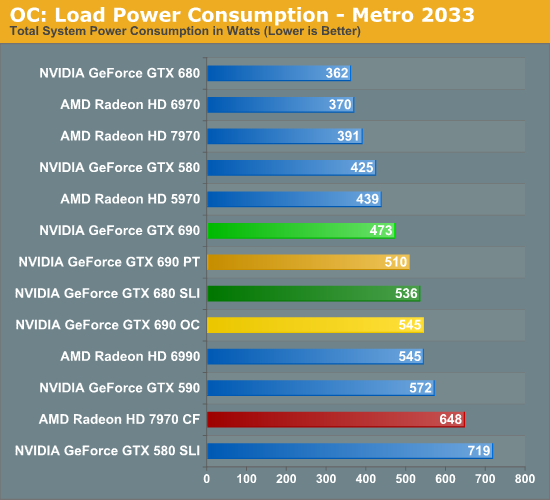
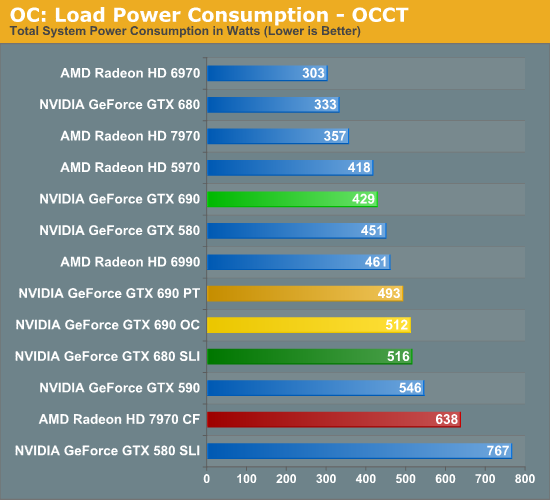
As expected, merely increasing the power target to 135% was enough to increase the GTX 690’s power consumption, though overclocking further adds to that. Even with the power target increase however, the power consumption at the wall for the GTX 690 is still lower than the GTX 680 SLI by over 20W, which is quite impressive. As we’ll see in our section on performance this is more than enough to erase the GTX 690’s performance gap, meaning at this point its still consuming less power than the GTX 680 SLI while offering better performance than its dual-card cousin.
It’s only after outright overclocking that we finally see power consumption equalize with the GTX 680 SLI. The overclocked GTX 690 is within 10W of the GTX 680 SLI, though as we’ll see the performance is notably higher.
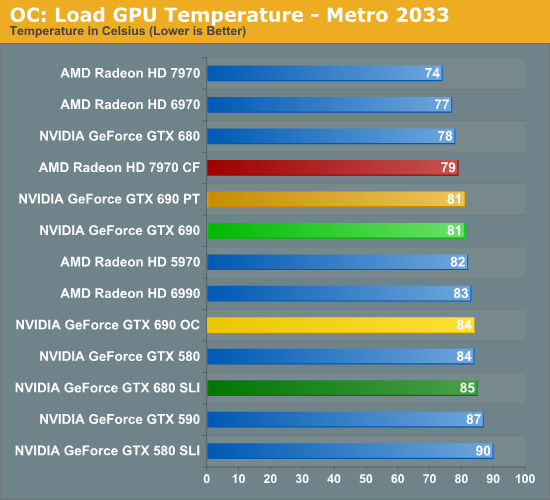
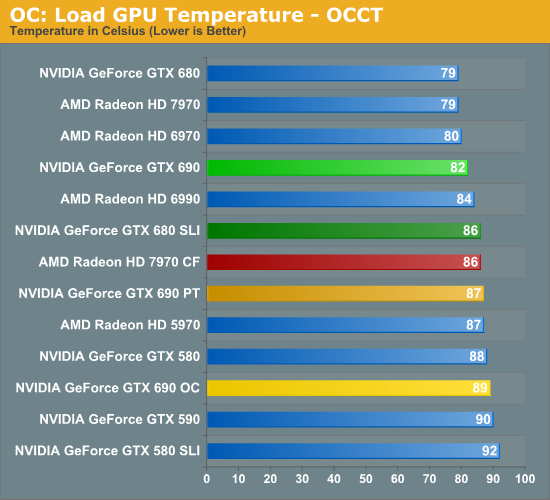
What does playing with clocks and the power target do to temperatures? The impact isn’t particularly bad, though we’re definitely reaching the highest temperatures we really want to hit. For the GTX 690 PT things are actually quite good under Metro, with the temperature not budging an inch even with the higher power consumption. Under OCCT however temperatures have risen 5C to 87C. Meanwhile the GTX 690 OC reaches 84C under Metro and a toasty 89C under Metro. These should be safe temperatures, but I would not want to cross 90C for any extended period of time.
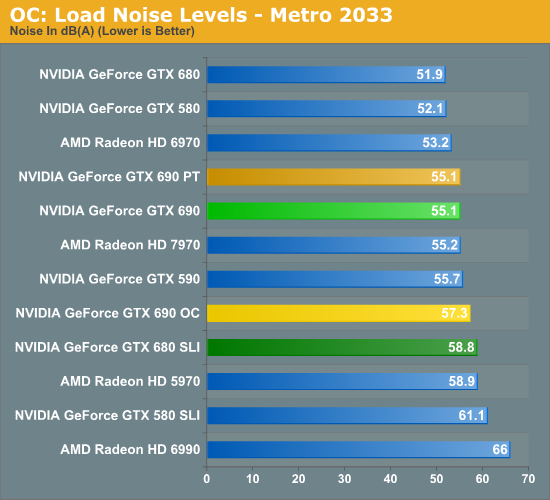
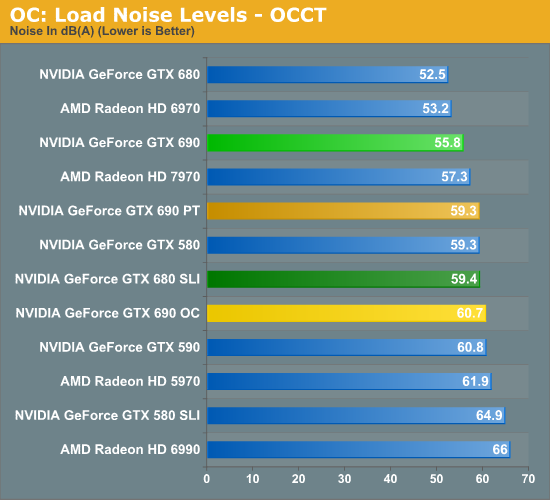
Finally we have load noise. Unsurprisingly, because load temperatures did not go up for the GTX 690 PT under Metro load noise has not gone up either. On the other hand load noise under OCCT has gone up 3.5dB, making the GTX 690 PT just as loud as our GTX 680 SLI in its adjacent configuration. In practice the noise impact from raising the power target is going trend closer to Metro than OCCT, but Metro is likely an overly optimistic scenario; there’s going to be at least a small increase in noise here.
The GTX 690 OC meanwhile approaches the noise level of the GTX 680 SLI under Metro, and shoots past it under OCCT. Considering the performance payoff some users will no doubt find this worth the noise, but it should be clear that overclocking like this means sacrificing the stock GTX 690’s quietness.










200 Comments
View All Comments
InsaneScientist - Sunday, May 6, 2012 - link
Well, let's be fair... it's not nVidia's fault. It's TSMC that can't get their act together to produce 28nm chips in volume.CeriseCogburn - Sunday, May 6, 2012 - link
The GTX680 has sold more card by the verified reviewers at NewEgg than the entire lot of the 7870's and 7850's at NewEgg combined, and that's just with ONE GTX680 sold by EVGA - check it out my friend...ROFL
GTX680 in one listing outsells the entire lineup of 7870 and 7850 COMBINED at newegg- with verified owners count.
HAHAHA
Yes, the supply is always "key". ROFL
vladanandtechy - Thursday, May 3, 2012 - link
I must confess that every logic i can think of says i don't need this GPU.....but.....i want it....i don't need it.....but damn it....i want it.....it's nvidia....it's aluminium....it's 4 GB VRAM....it's probably 5 times faster than what i have.......and i want to congratulate the team for the review wich i read from start to finish...but to be honest with you.....you don't need 19 pages to describe it...for me...."futureproof" says it all....mamisano - Thursday, May 3, 2012 - link
Is there any way you can post the average FPS achieved during OCCT tests? Curious how 680 SLI, 690 and 7970 CF compare in this regard.Ryan Smith - Thursday, May 3, 2012 - link
Sorry, but we don't currently record that data (though if it's a big enough deal we can certainly start).Filiprino - Thursday, May 3, 2012 - link
Simply put, NVIDIA has superior software department in comparison with AMD.AMD is mainstream. Whenever they try to reach the high end, they fail miserably, both on GPU and CPU camps. Driver issues with crossfire, trifire and quadfire with or without eyefinity in numerous games (with eyefinity even more problems) etc.
If they don't get their problems solved by Catalyst 12.5 buying AMD cards for high end builds (anything multicard related) is a waste of money. And that is sad.
CeriseCogburn - Thursday, May 3, 2012 - link
Yes, and the reviewer is constantly trying to catch nVidia in a big lie - and it shows - he even states how he never believed a word nVidia said about this card but had to admit it was all true.I have never, in many years, seen the same bad attitude given to amd's gpu's.
The bias in the write up is so blatant every time it's amazing they still get nVidia cards for review. The reviewer is clearly so pro amd he cannot hide it.
N4g4rok - Thursday, May 3, 2012 - link
He did say that Crossfire was so broken that he couldn't recommend it. He's been pointing out flaws in both companies along the way I think you should dial back the bias accusations a little bit.CeriseCogburn - Thursday, May 3, 2012 - link
Well if you want me to point out like 10 blatant direct wordings in this article I will. I'm not the only one who sees it, by the way. you want to tell me how he avoids totally broken amd drivers when he's posting the 7970CF ? Not like he had a choice there, your point is absolutely worthless.silverblue - Thursday, May 3, 2012 - link
Okay then, for our benefit (because we're stupid and that), please point out the reviewer's transgressions.